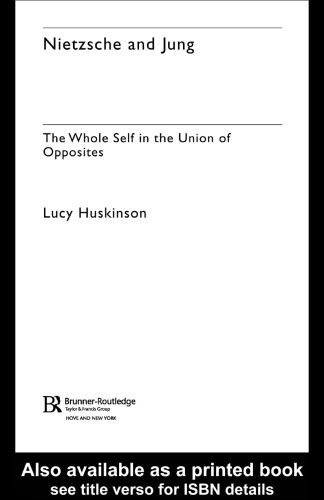

Most ebook files are in PDF format, so you can easily read them using various software such as Foxit Reader or directly on the Google Chrome browser.
Some ebook files are released by publishers in other formats such as .awz, .mobi, .epub, .fb2, etc. You may need to install specific software to read these formats on mobile/PC, such as Calibre.
Please read the tutorial at this link: https://ebookbell.com/faq
We offer FREE conversion to the popular formats you request; however, this may take some time. Therefore, right after payment, please email us, and we will try to provide the service as quickly as possible.
For some exceptional file formats or broken links (if any), please refrain from opening any disputes. Instead, email us first, and we will try to assist within a maximum of 6 hours.
EbookBell Team

0.0
0 reviews
ISBN 13: 9781583918333
Author: Lucy Huskinson
Was Jung's interpretation and assessment of Nietzsche accurate? Nietzsche and Jung considers the thought and personalities of two icons of twentieth century philosophical and psychological thought, and reveals the extraordinary connections between them. Through a thorough examination of their work, Nietzsche and Jung succeeds in illuminating complex areas of Nietzsche's thought and resolving ambiguities in Jung's reception of these theories. The location and analysis of the role played by opposites in the whole self according to Jung is considered, revealing the full extent of Nietzsche's influence. This rigorous and original analysis of Jungian theory and its philosophical roots, supported by Jung's seminars on Nietzsche's Zarathustra, leads to the development of a fresh interpretation of the theories of both. The shared model of selfhood is put into practice as the personalities of Nietzsche and Jung are evaluated according to the other's criteria for mental health, attempting to determine whether Nietzsche and Jung were themselves whole. Nietzsche and Jung demonstrates how our understanding of analytical psychology can be enriched by investigating its philosophical roots, and considers whether the whole self is a realistic possibility for each of us. This book will prove fascinating reading for students in psychology, philosophy and religion as well as practicing Jungian analysts.
1. Introduction
2. Opposites In Early Nietzsche: Metaphysical, Aesthetic and Psychological Opposites
3. Opposites In Nietzsche Post-1878: The Denial of Metaphysical Opposites
4. The Übermensch As a Union of Opposites
5. Opposites In the Jungian Model of the Psyche
6. The Self As a Union of Opposites
7. The Disagreement Between Nietzsche and Jung: The Process of Uniting Opposites
8. The Similarities Between Nietzsche and Jung: The Whole Self In the Union of Opposites
9. Nietzsche’s Madness: A Jungian Critique of Nietzsche’s Model
10. Nietzsche’s Absolution: A Metacritique of Jung’s Critique of Nietzsche’s Model
11. Jung’s Shadow: The Ambiguities of Jung’s Reception of Nietzsche Resolved
12. Jung’s Madness: A Nietzschean Critique of Jung’s Model
13. Whole Selves: Nietzsche’s Influence On Jung Revisited
Tags: Lucy Huskinson, Nietzsche, Self